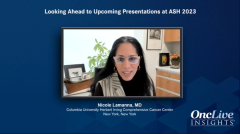
Recent Data in Relapsed/Refractory CLL/SLL
An expert on hematologic malignancies discusses recent data from ASH 2023 in relapsed/refractory CLL/SLL, highlighting the ALPINE study investigating zanubrutinib versus ibrutinib.
Episodes in this series

This is a video synopsis/summary of an Insights featuring: Nicole Lamanna, MD.
Dr. Lamanna discusses updates in the relapsed/refractory chronic lymphocytic leukemia (CLL) setting that will be presented at the 2023 American Society of Hematology (ASH) annual meeting.
She notes that treatment at relapse depends partly on prior therapy. For those who received frontline Bruton tyrosine kinase (BTK) inhibitors like ibrutinib, acalabrutinib, or zanubrutinib and progress, venetoclax-based treatments or non-covalent BTK inhibitors like pirtobrutinib are options. After frontline venetoclax, BTK inhibitors can be utilized. There is interest in evaluating novel agents as many patients have now received these standard therapies.
An oral presentation will provide an update from the ALPINE study comparing zanubrutinib to ibrutinib in relapsed/refractory CLL. With over 36 months of follow-up, the progression-free survival advantage of zanubrutinib persists. Over 50% of patients in both arms continue on treatment, with 36-month progression-free survival of 66% for zanubrutinib versus 54% for ibrutinib. This benefit is seen regardless of high-risk features like 17p deletion/TP53 mutations. The improved cardiac safety profile of zanubrutinib also remains over longer-term follow-up.
Video synopsis is AI-generated and reviewed by OncLive® editorial staff.





































